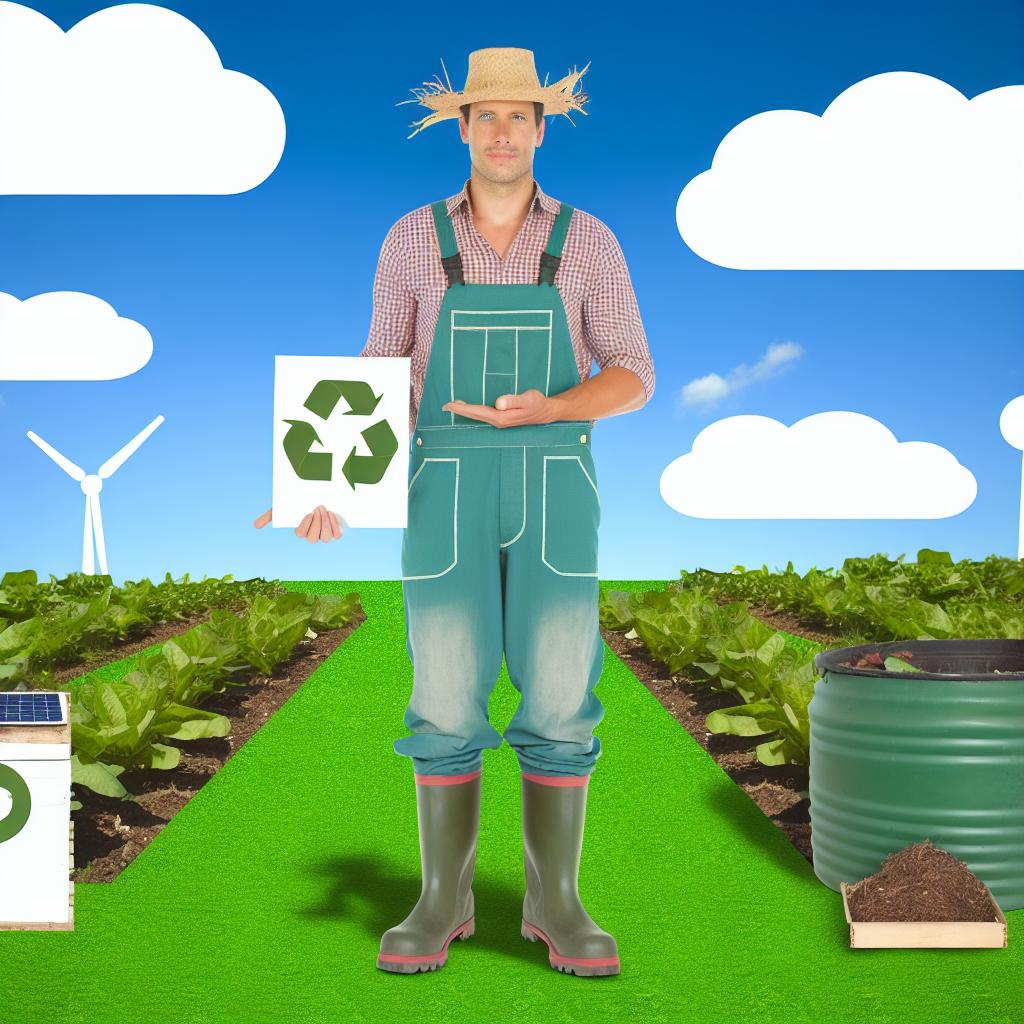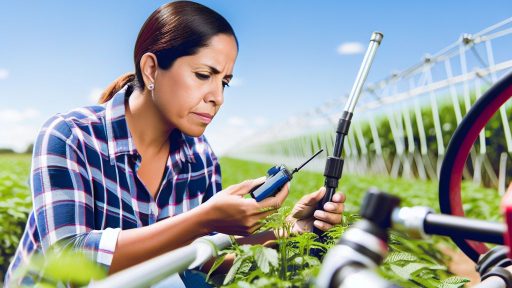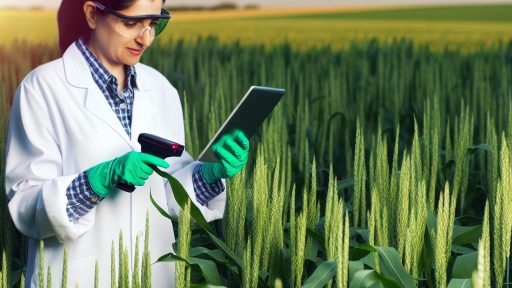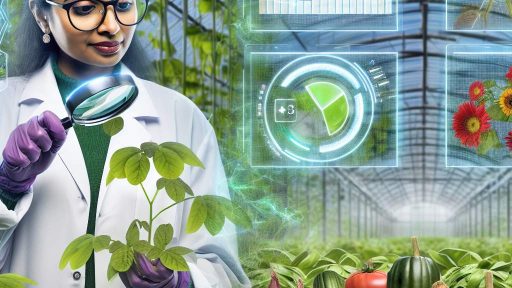Introduction to Organic Pest Control
Definition of Organic Pest Control
Organic pest control refers to managing pests using natural methods.
This approach minimizes the use of synthetic chemicals.
It focuses on maintaining ecological balance while protecting crops.
Farmers implement organic methods to reduce harm to beneficial organisms.
Importance of Organic Pest Control
Organic pest control plays a vital role in sustainable agriculture.
It promotes biodiversity, improving soil health and crop resilience.
Moreover, organic methods reduce chemical residues in food products.
This practice enhances consumer confidence in food safety.
Advancements in Organic Pest Control
Innovations in organic pest control are making farming more eco-friendly.
Modern techniques now include biological control and pheromone traps.
Additionally, farmers utilize companion planting to deter pests naturally.
Research continues to enhance the efficacy of organic solutions.
Challenges and Considerations
Despite its benefits, organic pest control presents challenges.
Farmers may face difficulties in managing persistent pests.
Furthermore, organic methods often require more labor and planning.
Transform Your Agribusiness
Unlock your farm's potential with expert advice tailored to your needs. Get actionable steps that drive real results.
Get StartedSuccessful implementation relies on continuous education and adaptation.
The Role of Biocontrol Agents in Organic Farming
Introduction to Biocontrol Agents
Biocontrol agents are natural organisms that help manage pest populations.
Farmers utilize these agents to reduce reliance on synthetic chemicals.
They significantly enhance the sustainability of farming practices.
Types of Biocontrol Agents
There are three main categories of biocontrol agents.
- Predators, which consume pests directly.
- Parasitoids, that lay eggs within pest bodies.
- Pathogens, which are disease-causing organisms targeting pests.
Examples of predators include ladybugs and lacewings.
Trichogramma wasps serve as effective parasitoids in various crops.
Fungi and bacteria represent common pathogens used in biocontrol.
Benefits of Using Biocontrol Agents
Implementing biocontrol agents leads to healthier ecosystems.
They help maintain a balanced ecosystem by controlling pest populations.
As a result, farmers experience reduced crop damage.
Additionally, biocontrol agents promote biodiversity in agricultural settings.
They also minimize the use of harmful pesticides, benefiting the environment.
Challenges of Biocontrol in Organic Farming
Despite their benefits, using biocontrol agents presents challenges.
Farmers must carefully monitor and manage these organisms.
Integration into existing farming systems requires knowledge and skill.
Furthermore, factors such as climate can impact their effectiveness.
Some biocontrol agents may also struggle in high pest-density scenarios.
Future Innovations in Biocontrol
The future of biocontrol looks promising with ongoing research.
Scientists are exploring novel agents for enhanced pest management.
Advancements in technology will facilitate the application of biocontrol methods.
Genetic research aims to improve the efficacy of natural agents.
Furthermore, collaboration between researchers and farmers is crucial.
Innovative Techniques: Using Natural Predators for Pest Management
Introduction to Natural Predators
Natural predators play a vital role in pest management.
Showcase Your Farming Business
Publish your professional farming services profile on our blog for a one-time fee of $200 and reach a dedicated audience of farmers and agribusiness owners.
Publish Your ProfileFarmers can utilize them to control pest populations effectively.
This method reduces the reliance on chemical pesticides.
Moreover, it supports ecological balance within farming systems.
Types of Natural Predators
Various species serve as natural pest predators.
Ladybugs are famous for consuming aphids.
Parasitic wasps target a range of harmful insects.
Additionally, birds and bats are effective at controlling pests.
These predators help maintain lower pest populations naturally.
Implementing Natural Predators
Farmers should assess their specific pest challenges first.
Identifying suitable natural predators is essential.
Cultivating habitats for these predators enhances their effectiveness.
Planting diverse crops can attract beneficial insects.
Furthermore, reducing pesticide use encourages natural predators to thrive.
Success Stories in Pest Management
Several farms have reported success using natural predators.
The Green Valley Organic Farm significantly minimized pest damage.
By releasing ladybugs, they effectively controlled aphid populations.
Another example is Riverbend Farms, which uses predatory insects.
Their approach has led to healthier crops and increased yields.
Challenges and Considerations
Despite the benefits, challenges exist with natural predators.
Farmers must ensure they choose the right species.
Not all predators are effective for every pest type.
Additionally, environmental factors can affect predator success.
Monitoring the ecosystem is crucial for long-term results.
Future of Pest Management
Innovations in natural predator use continue to evolve.
Research is underway to understand predator effectiveness better.
New technologies may enhance natural pest control methods.
Ultimately, integrating these practices promotes sustainable farming.
Farmers can build resilient ecosystems through these techniques.
Find Out More: Understanding Modern Crop Disease Detection Technologies For Sustainable Farming
Plant-Based Pesticides: Effectiveness and Applications
Introduction to Plant-Based Pesticides
Plant-based pesticides derive from natural plant substances.
They offer a viable alternative to synthetic chemicals.
Farmers increasingly adopt these solutions for several reasons.
One main reason is their reduced environmental impact.
Types of Plant-Based Pesticides
Several types of plant-based pesticides exist today.
- Neem oil acts as a powerful insect repellent.
- Pyrithrin, derived from chrysanthemum flowers, targets pests effectively.
- Garlic spray deters numerous unwanted insects.
- Essential oils can repel or kill pest populations.
These options provide a range of applications in pest control.
Effectiveness of Plant-Based Pesticides
Many studies highlight the effectiveness of these pesticides.
For instance, neem oil has shown success in controlling aphids and spider mites.
Moreover, research indicates that pyrethrins effectively eradicate bed bugs.
Farmers report fewer health risks when using these methods.
The residual effects typically last longer compared to traditional pesticides.
Showcase Your Farming Business
Publish your professional farming services profile on our blog for a one-time fee of $200 and reach a dedicated audience of farmers and agribusiness owners.
Publish Your ProfileApplications in Eco-Friendly Farming
Plant-based pesticides fit well within eco-friendly farming practices.
They are an integral part of integrated pest management strategies.
Farmers often use them in rotation with other non-chemical methods.
Additionally, they offer a solution for organic certification.
Studies show that their use leads to healthier crops and improved soil health.
Challenges and Considerations
Despite their advantages, challenges do exist.
Some plant-based pesticides may lose effectiveness over time.
Furthermore, certain formulations are less stable than synthetic ones.
Farmers should consider specific conditions affecting pesticide performance.
Nevertheless, overcoming these hurdles can yield significant benefits.
Learn More: Overcoming Challenges With Genetically Modified Crop Adoption
Integrating Technology in Organic Pest Control
Introduction to Technological Solutions
Technology plays a vital role in modern organic farming practices.
Farmers utilize apps and tools to enhance pest control methods.
These innovations promote sustainable and eco-friendly farming.
Pest Monitoring Apps
Pest monitoring apps offer real-time tracking of pest populations.
Farmers can identify infestations quickly and efficiently.
For instance, the Pest Finder app helps in identifying pests visually.
Users can compare images and recognize harmful species.
This proactive approach minimizes damage to crops.
Data Analytics for Pest Management
Data analytics tools provide insights into pest behavior patterns.
Farmers can make informed decisions based on statistical data.
Tools like FarmLogs help analyze environmental conditions.
Understanding these factors leads to effective pest management.
Farmers can tailor their approach to specific pest threats.
Biological Control Strategies
Biological control tools connect farmers with pest predators.
Applications like BugMatch facilitate these beneficial interactions.
Farmers can learn which natural enemies to introduce.
This encourages biodiversity on the farm.
Utilizing natural pest control methods remains a priority.
Community Support and Knowledge Sharing
Online platforms foster community support among organic farmers.
Farmers share experiences and strategies to tackle pest issues.
Forums like Growers Network provide valuable resources.
This collaborative approach enhances learning and innovation.
Farmers benefit from each other’s successes and challenges.
Future Directions in Organic Pest Control
Innovation continues to shape organic farming practices.
Technological advancements empower farmers to manage pests effectively.
These solutions promote sustainability and protect crops.
Embracing technology is essential for future success.
Discover More: Sustainable Livestock Management Systems Improving Farm Productivity

Community-Based Approaches: Knowledge Sharing and Support Networks
Importance of Community Engagement
Community engagement plays a crucial role in organic pest control innovation.
Showcase Your Farming Business
Publish your professional farming services profile on our blog for a one-time fee of $200 and reach a dedicated audience of farmers and agribusiness owners.
Publish Your ProfileFarmers benefit from shared experiences and collective problem-solving.
Moreover, strong networks enhance local agricultural resilience.
Building Support Networks
Establishing support networks fosters collaboration among farmers.
These networks facilitate the exchange of knowledge and resources.
For example, farmers can share successful pest management strategies.
Consequently, they learn from each other’s successes and failures.
Knowledge Sharing Platforms
Technology enhances knowledge sharing among farming communities.
Online forums and social media create spaces for discussion.
Farmers can easily ask questions and share solutions.
This immediate access to information promotes adaptive strategies.
Local Workshops and Training Sessions
Local workshops provide hands-on training in organic pest management.
Experts like Dr. Emily Stanton lead these sessions.
Participants learn practical techniques to tackle pests organically.
Moreover, Q&A sessions allow for tailored advice and support.
Peer Mentoring Initiatives
Peer mentoring connects experienced farmers with new ones.
This relationship builds confidence in using organic methods.
For instance, seasoned farmers can mentor others in natural pest control.
Such initiatives strengthen ties and promote sustainable practices.
Success Stories and Case Studies
Documenting success stories encourages widespread adoption of organic practices.
Case studies illustrate effective pest control methods and outcomes.
Communities share these stories at events and online platforms.
This visibility inspires others to embrace eco-friendly techniques.
You Might Also Like: Innovations In Genetic Engineering For Crop Improvement
Case Studies: Successful Implementation of Organic Pest Control Innovations
Enhancing Crop Yields at Green Meadow Farms
Green Meadow Farms adopted an innovative pest control system in 2021.
This system combined beneficial insects and organic repellents.
Initially, aphids and other pests harmed their vegetable crops.
By introducing ladybugs, they significantly reduced aphid populations.
Additionally, using neem oil as a natural repellent proved effective.
As a result, their crop yields increased by 30% within a year.
This success led them to expand their organic methods.
Revitalizing Local Orchards with Natural Solutions
Local orchards in Pine Valley implemented organic pest management techniques.
The techniques promoted biodiversity and soil health.
Initially, the orchards struggled with pests like codling moths.
They introduced pheromone traps to monitor and manage these pests.
They also planted companion flowers, attracting beneficial pollinators.
This strategy reduced pesticide use by 50% within the first season.
As a result, fruit quality and quantity improved significantly.
Innovation in Community Gardens
The Urban Green Community Gardens adopted organic methods in 2022.
They focused on complex intercropping to deter pests naturally.
Planting marigolds alongside vegetables repelled harmful insects effectively.
Showcase Your Farming Business
Publish your professional farming services profile on our blog for a one-time fee of $200 and reach a dedicated audience of farmers and agribusiness owners.
Publish Your ProfileThis approach supported local biodiversity and vibrant community involvement.
After one season, they reported a 40% reduction in pest-related damage.
Their model has inspired other urban gardens to follow suit.
Scientific Research Supporting Organic Strategies
Recent studies confirm the efficacy of organic pest control methods.
Research from the Sustainable Agriculture Institute highlighted several successful cases.
For instance, integrating beneficial nematodes effectively controlled grubs.
This innovative strategy reduces reliance on synthetic pesticides.
Such findings promote greater adoption among farmers nationwide.
Consequently, agricultural practices shift towards more eco-friendly solutions.
Challenges and Future Directions in Organic Pest Control Strategies
Current Limitations in Organic Pest Control
Organic farming faces numerous challenges in pest control.
Limited availability of effective organic pesticides hampers productivity.
Additionally, some pests have developed resistance to natural control methods.
This situation creates a significant challenge for farmers.
As a result, many growers struggle to meet market demand.
Emerging Innovations in Pest Management
Many innovative strategies are emerging in organic pest management.
For instance, biocontrol agents like beneficial insects are gaining traction.
These agents help regulate pest populations naturally.
Furthermore, the integration of technology enhances monitoring and control efforts.
Farmers increasingly adopt precision agriculture techniques.
Research and Development Focus Areas
Future research needs to focus on effective organic solutions.
Scientists should explore plant-based compounds for pest control.
Moreover, breeding pest-resistant crop varieties can be beneficial.
Funding and collaboration among researchers will drive progress.
Such initiatives will support sustainable agricultural practices.
Collaboration Among Stakeholders
Collaboration between farmers, researchers, and policymakers is crucial.
Engaging all stakeholders can accelerate the development of organic pest control methods.
Sharing knowledge and best practices leads to better outcomes.
Additionally, training programs can enhance farmers’ pest management skills.
Public Awareness and Education
Raising public awareness about organic pest control is vital.
Educational campaigns can inform consumers about the benefits of organic practices.
This awareness can drive demand for organically grown products.
Moreover, it can encourage more farmers to adopt sustainable techniques.
Additional Resources
Revolutionizing Agriculture: How Bee Vectoring Technology is …




